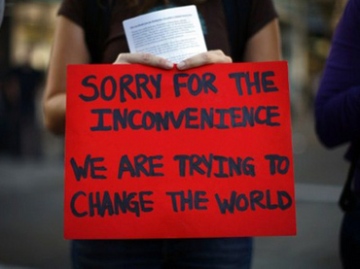Social movements throughout history have used the technology available to them to further their cause, most notably the use of the printing press to aid the American colonies in their independence. Literature could be printed in mass amounts and handed out to the public, not so different from how information today gets passed around. A quick tweet can reach hundreds of thousands of people within seconds, and if it goes viral, even more. Clay Shirky, in his essay “The Political Power of Social Media – Technology, the Public Sphere, and Political Change,” (2011) sums it up well by saying; “Social media increase shared awareness by propagating messages through social network.” But what does this mean for the people’s movement?
Of course, movements like the Civil Rights movement and the Suffragettes did not have social media as we know it today and yet were still successful, but in today’s society, it is hard to imagine a movement without thinking of its online presence. When thinking of the Occupy movement, #occupy and pictures of police brutality that had gone viral come to my mind almost immediately. In fact, I first learned about the Occupy movement from Twitter!
The video above shows the police brutality that was seen during the Occupy Wall Street protests. Bystanders were pepper sprayed by police forces.
The recent turmoil in Egypt has reached the public eye in a very real way; with photos and videos of the revolution being uploaded to social media as it happens, the public can see with their own eyes the injustice those afflicted are feeling. Sarah Joseph (2012) even brings up the point that many of the images that are uploaded are images that cannot be seen in mainstream media. So not only are you seeing firsthand accounts of these injustices, but you are seeing images that you would not be able to see any other way.
The Arab Spring and Occupy, for the most part, are non-violent protests and examples of what has become known as cyberwar (Johnston, 2000), which is a more civilized version of traditional fighting; so instead of blood and guts fighting, social media is a platform for fighting with words. Social media allows for information and different viewpoints to be accessed quickly, letting people develop their own arguments. It gives them a platform on which to debate those arguments, free from government persecution.
The above graph shows the numbers of retweets per day over a 75-day period during the Occupy Movement; over 394,463 tweets were retweeted when NYPD cleared Zuccotti Part in November of the protesters!
The success, or lack thereof, of the Occupy movement can be debated all day, but what is certain is the impact of the movement on social media. Even if you do not support the Occupy protestors, you know what the movement is about. You have seen the Facebook posts, the tweets, and the pictures that have gone viral. You are now aware of the cause they are peacefully fighting for, and is that not part of the point? Is it not important to bring the injustice of the situation to the consciousness of the public?
As Thich Nhat Hanh said in regards to Thich Quang Duc, a Vietnamese monk who set himself on fire in protest in 1963, “you have to do something extraordinary to make yourself heard,” (Johnston, 2000). Whether it be the Occupy protesters sitting in Zuccotti Park for days on end or the Egyptians overthrowing their leader, they did something extraordinary, thanks in part to the social media they used to plan and showcase the protest. Social media gains these types of movements the support they need to be successful; the more people they reach, the more pressure is put on the ruling body to do something about the injustice. But again, it was not social media that overthrew Mubarak, but the people. So maybe it is not so much that social media is the key to a social movement’s success, but it definitely unlocks a door on the way to success. What do you think? Is social media a key to success? Or does it double lock the door?
References
- Shirky, C. (2011) ‘The political power of social media – technology, the public sphere, and political change’, Foreign Affairs, Vol 90 (1). Retrieved from http://heinonline.org/HOL/Page?handle=hein.journals/fora90&div=8&g_sent=1&collection=journals#42
- Johnston, Josée (2000) ‘Pedagogical guerrillas, armed democrats, and revolutionary counter publics: Examining paradox in the Zapatista uprising in Chiapas, Mexico’, Theory and Society, Vol 29 (4): 463-505.
- Joseph, S. (2012). Social media, political change, and human rights. Boston College International and Comparative Law Review, 35 (1), 145-188. Retrieved from http://heinonline.org/HOL/Page?handle=hein.journals/bcic35&div=6&collection=journals&set_as_cursor=1&men_tab=srchresults&terms=90 Foreign Aff. 28&type=matchall




I really like the way you incorporate your own personal experiences into your blogs.
Also I like how you the pictures and graph to show how social media helps peoples movement in creating awareness and sharing information.
I think the blog would have been even better if you would have included one of the videos that went viral.
WRDt4dJS
I really like the topic you chose for this blog as it seems so relevant today
I also thought your use of examples and use of pictures to present these was effective
I agree that including one of the videos that went viral wound help improve your blog
wwxfeidD